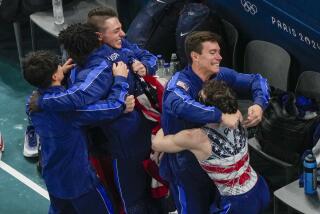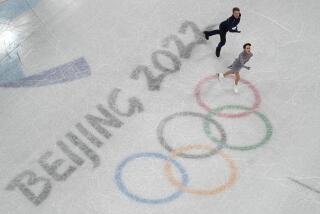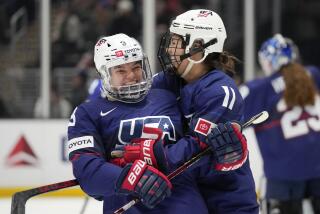Czech Mate
- Share via
NAGANO, Japan — The Olympic dream tournament turned out to be a historic event for reasons no one could have dreamed when NHL players were invited to participate.
The Czech Republic, pitted against teams blessed with a wealth of NHL players to choose from, lived its impossible gold-medal dream Sunday when goaltender Dominik Hasek’s steely nerves carried its hockey team to a 1-0 victory over Russia and the country’s first Olympic championship.
Hasek, who had been superb in the Czechs’ 2-1 shootout victory over Canada in the semifinals, was no less spectacular Sunday. Petr Svoboda’s goal at 8:08 of the third period might have seemed a razor-thin margin, but Hasek made that lead seem insurmountable with his poise, calm and unflagging concentration.
Svoboda, a 14-year NHL veteran who plays for the Philadelphia Flyers, gave Hasek all the support he needed. After Russian goalie Mikhail Shtalenkov got a stoppage in play by falling on the puck in his crease, the faceoff came out to the left circle. Pavel Patera won it from Alexei Yashin and drew the puck back to Martin Prochazka, who slipped it back to Svoboda.
Svoboda waited to see how much traffic there was in the slot and held onto the puck, waiting for an opening. Finally, about three strides in from the point, he unleashed a hard shot that whistled past Shtalenkov’s glove, setting off roars from the Czech fans and inspiring a fist-pumping dance from Hasek at the other end of the ice.
The Czechs were 5-1 in the tournament. Russia, which won the silver medal, was also 5-1.
The Czechs had twice come eart-stoppingly close to scoring. The first time, Jaromir Jagr hit the left post at 10:16 of the second period on a breakaway and on the second occasion, Josef Beranek hit the right post in the third period. Shtalenkov fell on the puck to stop play after thatsecond close call, precipitating the faceoff that set up Svoboda’s goal.
Hasek was voted the best goalie of the tournament by the directorate of the International Ice Hockey Federation and Russian right wing Pavel Bure was voted the best forward. Rob Blake of Canada and the Kings was voted the tournament’s top defenseman.
Hasek hurled his gloves in the air in celebration as the buzzer sounded, lying at the bottom of a pile of crying, laughing teammates. The disconsolate Russians gathered around Shtalenkov--the Mighty Duck backup goalie--and watched their opponents exult.
The game involved 32 players from 14 NHL clubs. The Pittsburgh Penguins contributed the most players, six. Their representatives were Jagr, Robert Lang, Jiri Slegr and Martin Straka on the Czech Republic’s team and Alexei Morozov and Darius Kasparaitis on Russia’s squad.
And although the finalists were not from North America and might not have produced the kind of TV attraction CBS undoubtedly would have preferred, the atmosphere at Big Hat was still lively and the 8,593 fans threw themselves into the emotions of the game.
There was much to enjoy, even if some of the players involved were not household names even among hockey fans.
That either team made it to the finals is a tribute to their competitiveness and persistence. Many prominent Russian players declined to play in the Olympics, citing past feuds with their country’s hockey federation or claiming they needed to conserve their energy for the long NHL season. The Czechs did not have as large a pool of NHL players to choose from as did the Russians and they passed over several players because of questions about their citizenship.
Czech fans, unprompted by the scoreboard, waved Czech flags and began spontaneous, sing-song chants meant to inspire their players. Russian fans responded in kind. Fans with no allegiance were free to sit back and enjoy the spectacle that unfolded before them.
Both teams were cautious in the first period, perhaps awed by the magnitude of the occasion. Neither scored and neither goaltender was severely tested, although both teams had power-play opportunities.
The Czechs had some cause to worry when Jagr took a bruising hit from Russian defenseman Alex Zhitnik in the final minute of the period and appeared to be stunned.
Zhitnik, the former King who now plays for the Buffalo Sabres and is better known for his offensive skills than his defensive prowess, hit Jagr at full speed with his right shoulder, catching Jagr in the face. Jagr, who wears a protective visor over his eyes, skated slowly to the bench and sat with his head down and his hands over his eyes.
He wasn’t cut, but he pressed the towel to his face and was clearly in some discomfort. However, he returned for the second period with no evidence of an injury.
Russia outshot the Czechs, 9-6, in the first period.
Play opened up a bit in the second period and both teams generated more scoring chances. Russia again had an advantage in shots, 6-5, 6-5, but the game was scoreless.
Hasek had the tougher shots and was equal to the task. He thrust out his right arm to make a point-blank save on winger Andrei Kovalenko at 8:15 of the period and hugged the post to deny Morozov after Valeri Zelepukin put the puck in front.
The Czechs made Shtalenkov nervous too. Patera eluded Alexei Zhamnov at the blue line and broke in alone on Shtalenkov at 16:24, but the puck rolled off his stick before he could take a shot.
(BEGIN TEXT OF INFOBOX / INFOGRAPHIC)
NHL Connection
Most expected Canada and the United States--with rosters entirely of NHL players--to reach the gold-medal game. But the NHL connection has been anything but a guarantee for success. Neither Canada nor the U.S. earned a medal. Number of NHL players on rosters of teams that reached the semifinals:
Team: NHL Players
Czech Republic (gold): 11
Russia (silver): 21
Finland (bronze): 13
Canada (no medal): 23
Note: All 23 U.S. players are from the NHL.
More to Read
Go beyond the scoreboard
Get the latest on L.A.'s teams in the daily Sports Report newsletter.
You may occasionally receive promotional content from the Los Angeles Times.







